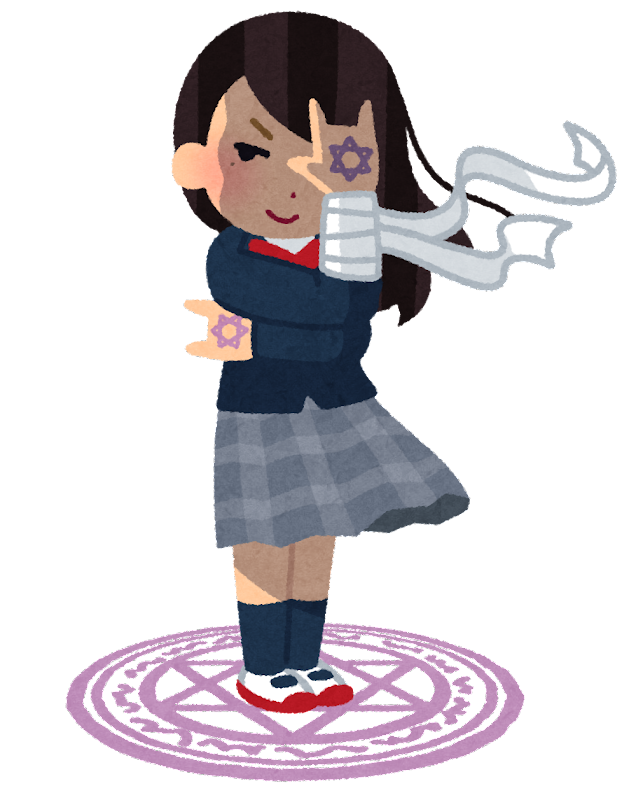What is “Chūnibyō (中二病、厨二病)” ?
It is a slang term for an excessive self-consciousness and behavior characteristic of adolescence.
In Japan, “Chunibyo” is an image similar to the following picture. She thinks she is a character in a cartoon (called anime in Japan) and believes she has fantastic powers. Her Chunibyo type is Evil-eye type (called “jaki gan”).

Japanese spelling
Chunibyo is written in kanji as “中二病” (sometimes written “厨二病”) and in hiragana as “ちゅうにびょう.
- “中二 (ちゅうに)” means junior-high-school second-year in Japan
- “病 (びょう)” means like syndrome in this slang
Word description
Internet slang that makes fun of narcissistic fantasies and preferences that are common among adolescents. It refers to unnaturally mature speech and behavior, unfounded beliefs that one is special, or complexes.
In Japan, it is most common in the second year of junior high school (age 14, eighth-grade in English-speaking countries, mainly teenagers). This is why it is called “中二病” (translated as “second year syndrome”).
It is described as a “病 (=syndrome)”, but it has nothing to do with an actual medical or mental illness that needs to be treated. The name is intended to refer to a transient illness, as it is a psychological condition that children of that age tend to have.
Types of Chunibyo
According to “中二病取扱説明書 (=Chunibyo Instruction Manual)” by light novelist Houya Saegami, there are three main types of Chunibyo.
DQN type
They act antisocial or delinquent and think they are cool. They are serious or timid at heart and cannot be true delinquents. They often make false claims about fights and criminal acts. “DQN” is Internet slang for “antisocial person” or “annoying delinquent type”.
Subculture type
They do not follow the popular trends, prefer minor trends, and try to be special and different from others. They do not like subculture, but are satisfied with their different interests and think they are cool.
Evil-eye type (called “邪気眼 (jaki gan)”)
They yearn for mysterious and supernatural powers and believe that they have hidden powers that cannot be suppressed when manifested due to possession by a monster, and they take pleasure in fantasizing about themselves having such “fantastic powers”. He/She also creates characters with such a setup.
How to be called in other countries
Other words with similar meanings in other countries and languages seem to be referred to as:
- English: eighth-grader syndrome (Ref. Wikipedia)
References
The following web pages were consulted in writing this article:
Source of pictures: Irasutoya (いらすとや) – Cute and adorable images (like caricatures) are the works of Irastoya, a web site offering free images. You can also use them for free, but free use is subject to conditions.

Comments